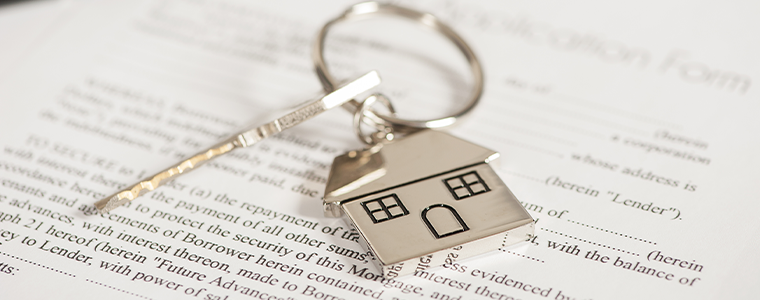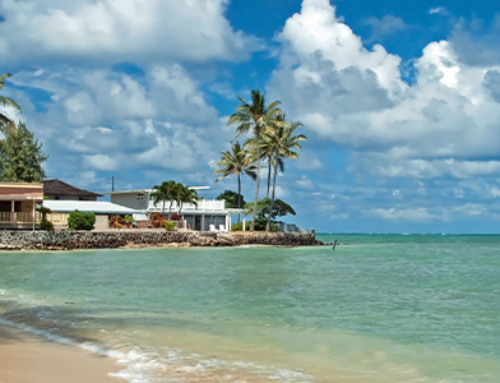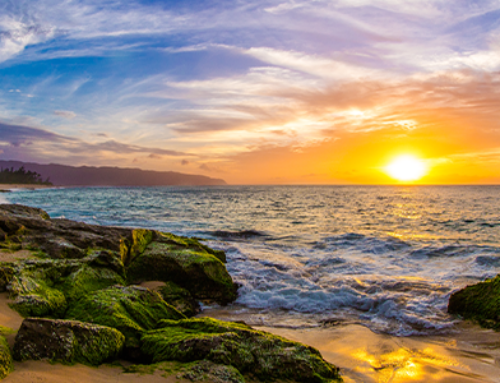So, you’re ready to move to Hawaii, but you’re not quite ready to buy a home yet?
We completely understand! Moving to Hawaii is a big change, and jumping right into homeownership in the Aloha State might be a bigger commitment than you’re ready for.
Finding your first rental in Hawaii can be tricky—especially if you’re new to the state and don’t know anybody out here. However, the tips we’ll share with you below will make it a lot easier.
Keep reading to discover how to locate the right spot, how to get landlords interested in renting to you, what makes renting in Hawaii different than other places, how to avoid common rental scams, what to do if you have pets, and more.
Tip #1: Get to Hawaii First
We know; it’s not the ideal situation. We also know it’s not possible for everyone.
However, you’ll simply have a much easier time securing a rental in Hawaii if you’re already on your island of choice. Here’s why:
Many landlords simply won’t rent to you sight unseen. Of course, there are exceptions. However, by and large, landlords want to meet their tenants before agreeing to a rental.
Tip: Get a Local Number
Housing can be so competitive in Hawaii that some landlords won’t even return phone calls that aren’t from the Hawaii area code—808. Consider getting a prepaid phone with an 808 area code when you arrive to avoid this problem. It can also be helpful when applying for jobs, since employers often prefer to hire people who are already in Hawaii, too.
Being on island can help you avoid most common rental scams. You’ll find more info on this topic below, including tips on how to protect yourself. Simply put, if you’re able to tour a place before you rent, it’s much more likely to be a legitimate rental.
Ultimately, your best bet is to come out to Hawaii and stay in some temporary digs until you find the right long-term rental. If you can crash with a friend, great. Otherwise, consider an AirBnB/Vrbo rental, a hotel stay, or a hostel if you’re on a budget.
Not Sure Which Hawaiian Island You Want to Live On?
Get the run-down on Oahu, the Big Island, Maui, and Kauai so you can pick the right Hawaiian island for you. [Read More]
Tip #2: Check Rental Sites Early and Often
When it comes to finding available rentals, you might be surprised to learn that Hawaii is pretty similar to the mainland in this regard. Craigslist and Facebook Groups are both popular sites for Hawaii rental listings. Some rentals have been popping up on Zillow recently. However, it’s not as popular yet, so you’ll find fewer listings there.
Below, we’ve posted links to the most popular sites for rental listings in Hawaii by island. We don’t endorse any one of these in particular, and this list isn’t exhaustive. However, these offer a good place to begin your search.
Facebook Groups
Statewide:
- Hawaii – Housing, Apartments, Rooms, Sublets, Roommates (Statewide)
- Hawaii Rentals (Statewide)
Oahu:
- Oahu Homes for Rent and Sale
- Honolulu Rentals, Apartments, Housing, Rooms, Sublets, Roommates
- Hawaii Real Estate & Rentals (Oahu)
- Oahu Real Estate Rentals/Sales
- Moving to Oahu
Maui:
- Maui Housing – Rentals and Properties for Sale
- Maui Community Housing Board
- Maui Home & Apartment Rentals
- Dog-Friendly Home Rentals on Maui!
Big Island:
- Kailua Kona Long Term Rentals
- Rentals And Living Situations On The East Side
- Big Island Community Housing Board
- Discover The Big Island 🌴 | I am moving to The Big Island of Hawaii
Kauai:
- For Rent ~ Kauai Only ~ House ~ Apartment ~ Condominium ~ Studio ~ ETC……
- Kauai Creative Housing
- Conscious Housing Kauai
Craigslist
Craigslist remains one of the most frequently-used sites for housing in Hawaii. However, considering the anonymous nature of Craigslist, it’s also the site that tends to attracts the most scams. Make sure you review our tips below before you peruse the Craigslist listings.
Other Sites
- Zillow Hawaii Rentals– Although you’ll find fewer listings on Zillow, many of these are listed through real estate agents, which offers an extra layer of legitimacy.
- AirBnB| VRBO – If you’re just looking for a month or two in paradise—or a place to crash while you secure a long-term rental—try these two sites.
Tip #3: Beware of Rental Scams
While sites like Craigslist and Facebook have made it easier for tenants and landlords to connect, it’s also opened the door to rental rip-offs. Often times, rental scams prey on people who aren’t in Hawaii already. As you look at listings and connect with potential landlords, look out for the following red flags. These may alert you that something’s not quite right.
Is It Too Good to Be True?
If the rental you’re looking at is priced way under market value for the number of bedrooms or the location, it probably isn’t legit. Check out comparable listings to get a feel for what the going rate is for the type of place you want. Be wary of anything that’s significantly out of line with everything else you’re seeing.
Nobody Can Meet You in Person
If the landlord or property manager can’t meet in person—ever—this can be a big red flag. (Remember how we said it was better to secure a spot once you get here? This is the reason.) Common themes in these schemes involve mission trips to other countries or extended travel as reasons for the landlord’s absence. There should always be someone locally available to meet you in person before you hand over a check. If not, look elsewhere. (After all, if there’s no one available locally, what are they going to do if something breaks in your apartment?!)
If this same absentee landlord/property manager wants some kind of wire or bank transfer, exercise extreme caution.
Your Online Research Leaves You Uneasy
No matter what, it’s always a good idea to do your homework on any property you’re renting.
- If you’re renting directly from the property owner, it’s easy to search the county property records to see if the name you’re given matches the records. If it doesn’t, ask questions. The last thing you want is to pay rent to someone who’s not the owner, only to find out that person is not passing on that rent as promised.
- If you’re renting through a property management company, Google them and read any related online reviews. If a company has overwhelmingly bad feedback, you may want to keep looking.
- You might also consider searching the rental address on Google to see what comes up. If the location is an active property for sale, there might be something fishy going on. Scammers have been known to take photos from active real estate listings and use them in Craigslist postings.
There’s No Written Lease
Finally, insist on a written lease agreement. Don’t let anyone tell you that written agreements aren’t the way things are done in Hawaii. That’s just not true. You’re always better off having something on paper that defines your relationship with anyone you live with. This is especially true if you’re handing over a deposit.
We’ll cover more on rental leases in Hawaii in a moment so you know what to look for. But, first, let’s cover a few more points around finding the right place to rent.
Tip #4: Work Your Network
Some of the best places to rent in Hawaii never even make it to Craigslist. Instead, they go to someone’s cousin’s brother’s co-worker.
Relationships are how a lot of things get done in Hawaii. If you have any connections here at all—family, friends, acquaintances—put the word out that you’re looking for a rental. The perfect place might land right in your lap as a result.
Tip: Common Connections Can Grease the Wheel
A lot of people in Hawaii are more willing to rent to someone who’s a known quantity, even if you’re a third-degree connection to someone’s auntie. Don’t be afraid to mention people you know in common. It can help you stand out when there are a number of applicants for the same place.
In summary, tell anyone and everyone you know what you’re looking for in a rental. It can only help you in the long run.
Tip #5: Know What to Expect in Hawaii
As you’ve seen, some aspects of the Hawaii rental market work similarly to the way they do on the mainland. However, Hawaii rentals have some quirks that are likely different than what you’re used to. We’ll go over the biggest ones below so you know what to expect.
What’s an Ohana?
Ohana means “family” in Hawaiian. However, ohanas are also a particular type of housing unit in Hawaii, ones that were often used for family members, hence the name. An ohana is a smaller unit that’s found on a property with a larger house. For example, you may find a 2,500-square-foot house that shares a half-acre lot with a 700-square-foot ohana.
Some ohanas are attached to the main house, while others are detached. However, all official ohanas have their own separate entrance. From there, amenities will vary from ohana to ohana. Additionally, rules for ohanas vary from county to county, so you’ll find different situations on Maui vs. Oahu vs. Kauai vs. the Big Island.
If you decide to choose an ohana, you may end up sharing your property with your landlord. Obviously, this comes with its pros and cons. Before committing to this type of situation, make sure your landlord is someone you can get along with. Otherwise, your ohana situation may get tricky—fast.
What Do You Mean There’s No Stove?
Some rentals in Hawaii come without a stove. Instead, there may be a hot plate—or no cooking equipment at all. In many cases, this peculiar setup has to do with county zoning laws and limits on the number of kitchens on a property.
This can be a fairly common scenario in certain parts of Hawaii, so we wanted to make you aware. For some people, not having a real stove—or an oven—is a deal breaker. If that’s the case for you, look at rental listings carefully so you don’t waste your time.
Lanais and Other Outdoor Living Spaces
You’ll find plenty of outdoor living space in Hawaii. Maybe it’s because of the way each county has structured its zoning laws—or maybe it’s because the weather’s pretty great year-round. Either way, in Hawaii, you’ll find living rooms set up in garages, dining areas set up in car ports, and big lanai (patios) where families gather nightly. You’ll also often find appliances in garages and car ports, like refrigerators, chest freezers, washers, and dryers.
In many ways, these big, livable outdoor spaces can make a smaller house much more feasible. As you’re looking at rentals, don’t overlook what you can do with your outdoor space in Hawaii.
Tip #6: Know That Pets Mean a Challenge
You’ll see these dreaded words on many rental listings in Hawaii: “no pets.” Out here, it can be tough to find a landlord who’s willing to rent to someone with cats or dogs. So if you’re moving to Hawaii with your pet, know that it’s going to be a bit of an uphill battle to find a spot.
However, that doesn’t mean it will be impossible. Your best bets are to:
- Work your network – People are more likely to relax their rules for people they know. Ask around once you’re here, and you may get lucky.
- Be prepared to pay a pet deposit – It’s now legal for landlords to charge a pet deposit, up to a maximum of one month’s rent. The deposit is treated like your security deposit, and it may be returned if there’s no damage to your unit. If you go this route, make sure the deposit and its conditions for its return are documented in your lease.
Tip #7: Be Flexible, but Ready to Take Action
Your first place in Hawaii may not be perfect. However, it’s also a way to get your foot in the door, decide whether Hawaii is the right place for you, and establish yourself on your island of choice.
So if you find something that hits all of your “musts” but might be missing a few “wants,” think seriously about moving in. Properties move fast in Hawaii. If you keep waiting for the perfect spot, you may be waiting a while.
Tip: Be Realistic About Your Timeline
Many agreements in Hawaii require tenants to give 30 days’ notice to their landlords. As a result, landlords only usually know about 30-60 days out that they’ll have an vacancy. So if you’re moving to Hawaii six months from now, there’s not much you can do in terms of securing housing. Instead, use that time to research islands, neighborhoods, and prices. That way, you’re ready when it’s go time.
Tip #8: Read Your Lease Carefully
Once you’ve found the perfect place, it’s time to make things official. As we said earlier, expect to sign a lease. Short-term rentals are carefully regulated in Hawaii, and anything more than six months is considered a long-term rental. As a result, most leases in Hawaii are written for terms of six months or longer. One-year leases are also common.
Before you sign, make sure you understand everything you’re agreeing to, especially:
- How long the lease runs
- Whether your lease will go month-to-month after the initial term expires or whether you will sign another lease
- If your lease does convert to a month-to-month agreement, how much notice you need to give if you plan to move out and how much notice your landlord is required to give if they choose to end your tenancy
- How you will get your deposit back (Make sure the correct amount is documented on the lease!)
Additionally, if you’ve agreed on any repairs or improvements to the property, it’s a good idea to get those in writing.
Tip: Take a Video When You Move In
When you move in, it’s a great idea to walk around and take a video of the current state of the property. Make note of anything that’s broken. If your landlord wants to be there during the walkthrough, great. This will only offer even more proof as to the state of the rental when you moved in. That way, if there are any disputes when you move out, you’ll have solid evidence you both can refer to.
Renting Your First Home in Hawaii
As we said, the first home you rent in Hawaii may not be perfect—but it will always have a special place in your heart. After all, it’s your launching pad for life in paradise. Once you’ve got your first rental locked down, you’ll be well on your way to enjoying the Hawaii lifestyle, and all that’s waiting for you in the islands.
Making the big move to Hawaii? We’d be happy to help you get all of your possessions to your new rental. Plus, we can also store your items while you look for the perfect place. Just reach out to one of our experts to get started for a complimentary quote for your Hawaii move.
Tell us about your move!



